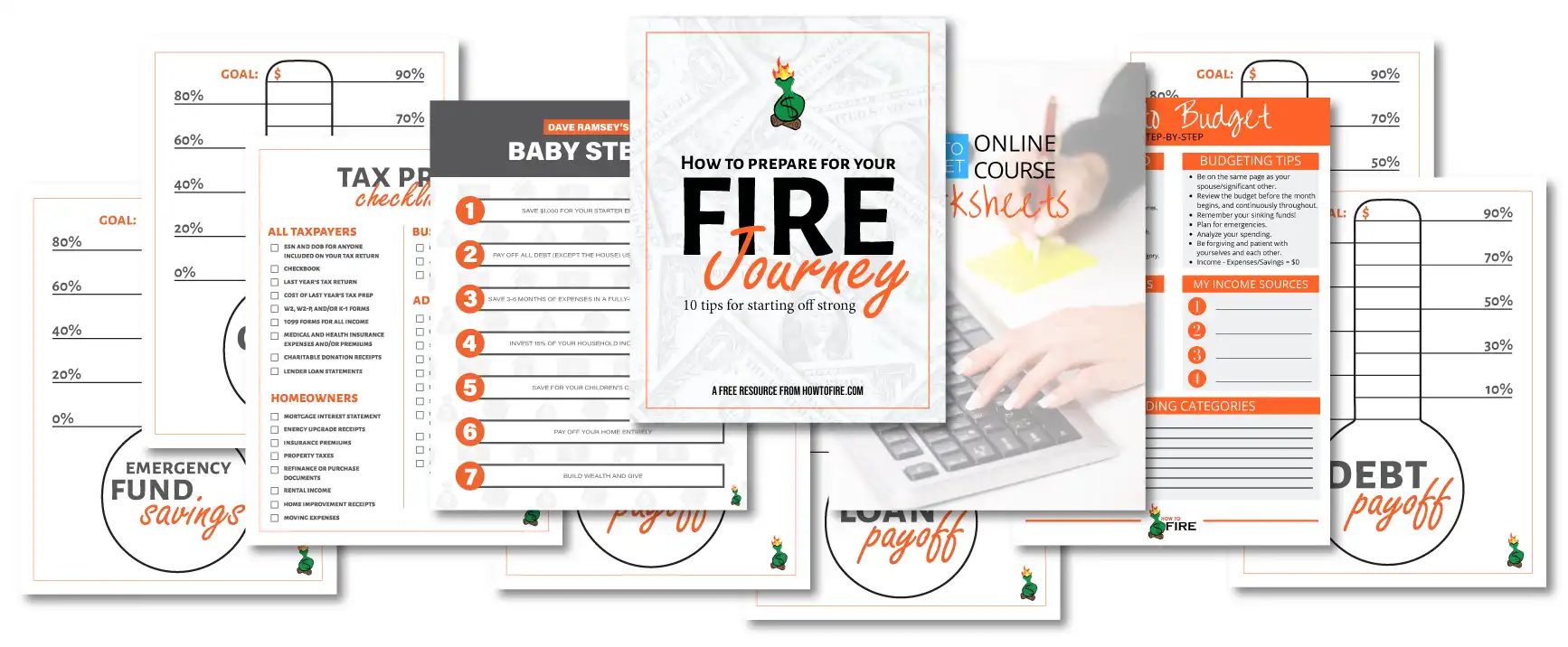Financial success is an important matter that people relate to differently depending on their unique values and personalities. For some, it could mean having enough money to retire early. For others, it could mean being self-employed or achieving a high salary, or any combination of these. There are different facets to consider and different financial success definitions that people attach themselves to in different contexts.
The context in which you define ‘financial success‘ will influence your financial future and help establish goals. Starting the financial planning and financial literacy journey help people to stay financially healthy throughout their lifetime.In this article, we will cover the ways financial success can be defined and how to get there.
Table of Contents
What Does Financial Success Mean?
Financial success can have various definitions depending on the person and their unique financial goals. Many people view being financially successful as becoming debt-free, having more disposable income, or being financially set for retirement. For example, those nearing retirement age may view their financial success as living a comfortable lifestyle in their golden years. In contrast, younger folks may view it as paying off a hefty loan. Overall, financial success means that people have more financial freedom in their life with more money and overall wealth.
12 Steps to Achieve Financial Success
Achieving financial success is essential because it gives people the freedom and space to make choices beyond the necessities. It can work in many ways depending on each person’s circumstances. Read on for ten steps to help you achieve financial success.
1. Make a Plan And Set Goals
Having a specific goal to aim for is an essential first step. The goal may require a certain amount of money or a particular income to attain a successful result. For example, if your goal is to save enough money before retiring, there needs to be enough funds set aside to make this happen. In this case, your goal and time frame will dictate how much money will be required to meet that goal.For any financial goal, it is crucial to have a plan on how you will achieve success.
Using money saving charts or an emergency fund is a great way to set aside money for future investments. It is always important to start saving as early as possible, and plans can include how much to save each week or month.
Gain access to all of our free resources!
- eBooks
- Spreadsheets
- Printables
- Other great Freebies!
2. Invest In Yourself
Educational opportunities like college degrees and vocational certifications are a great way to invest in your financial future. By expanding your education and skills, you add value to your financial life. In addition, companies have increased interest in employees with desirable skills, increasing their opportunities for jobs with higher pay.
For those who have already invested in their education, additional schooling and certifications such as Master’s degrees can allow you to keep up with the ever-changing workforce and increase your wealth over time. Another investment you can make with your valuable skills and education is to start your own company or business using those skills. Many entrepreneurs have used their knowledge and expertise to create thriving businesses. Investing in your skills and financial assets with a long-term view can increase your financial situation over time.
3. Determine Your Net Worth
Net worth is an essential indicator of financial health. It refers to the difference between total assets and liabilities in your finances. Assets are valuable resources that can be converted into cash. At the same time, liabilities are debts that will need to be paid off somehow – whether through payment, collecting the assets owed, or other means.
For example, a car would be an asset, while a personal loan or credit card debt would be a liability. Many different methods are used to determine net worth, including evaluating assets minus liabilities, owner’s equity in the business, and the total value of all assets. This process can help determine how far you are from financial success by looking at expenses versus financial liabilities.
Track all of your account balances and your net worth in one place. Get access to a Retirement Planner, Fee Analyzer, Portfolio Checkup, Contribution Calculators, and so much more with, Empower!
- Early pay and cash advances
- Easy account linking
- Earn cash back
- Budgeting tools to monitor spending and expenses
- An inexpensive way to borrow funds
- The amount borrowed is non-customizable
- Requires a subscription
- Low APY
- Need an Empower card to receive free and instant cash advances
4. Create and Stick to a Budget
Having a budget to follow is essential in the quest to achieve financial success. It reduces overspending, helps keep track of your net worth, and can increase savings. There are various necessities to spend money on each month, and it is wise to keep track of this. You can create a budget that includes the entirety of your expenses, including monthly expenses like rent or purchasing assets such as cars.
An easy way to start creating a budget is to jot down all your expenses and income for a month. Once you have that list, you can put the appropriate categories with their corresponding amounts. For example, if food or rent is an expense, add the amount paid for that item and place it in the appropriate category. Once this is complete, come up with a reasonable amount you can put towards savings each month, and track how much is left over for yourself. Next, consider putting away the extra money left towards emergency savings accounts or a retirement savings plan.
Check out these budget templates to get started!
5. Pay Off Debt (And Avoid It Moving Forward)
An essential financial goal to have is paying off debt. It can be challenging to part with the money you worked hard for, but having one less monthly payment can help free up your budget and improve your net worth by lowering liabilities and increasing assets. The best way to pay off debt is to pay more than the minimum required amount every month. This will ensure that the debt is paid off over a shorter period, which helps to establish good credit habits and leave you with free money in your accounts. Having a clear spending budget can help you to avoid the need to borrow money
6. Build Credit History
Building positive credit history is an integral part of financial stability. Having good credit is a goal many want to achieve. Most people will need to open a credit card or loan at some point in their life. Having good credit can help you get a favorable interest rate on loans and credit cards, as well as better deals on mortgages and car loans. Keep track of all your accounts, and make sure to pay off the total balance each month.
This can help establish a positive payment history and improve your credit score. If you fall behind on payments, it is good to contact your creditor and try to work out a payment arrangement. Good advice on building a positive credit history is to make sure you have money to pay off small purchases or do not make the purchase.
Need help repairing your credit? Here’s an ultimate guide on credit repair!
7. Establish an Emergency Savings Fund
Having an emergency savings fund in place protects you financially. Even if you have a great job and always pay your bills on time, emergencies happen that may risk the health of your financial security. Whether it’s a computer that needs replacing or an unexpected medical emergency, having some extra cash could help you avoid borrowing money or using credit cards. The best way to build an emergency fund is to have money deducted from every paycheck into a savings account that you do not have access to. Having an emergency fund will help you avoid spending money and create good habits to save regularly.
8. Invest for Retirement
Saving up for retirement ensures you have money available for later years when you no longer work a typical day job. It may be tempting to spend your hard-earned income as soon as you earn it. Still, that behavior can negatively impact your personal finance in the future. Making smart financial decisions early in life will only benefit your financial situation for the future.
With a good amount of money saved in a tax-advantaged account, such as a 401k or roth IRA, you can grow your money over time and avoid paying taxes on the interest or gains. While there are many different ways to invest, it is important to have at least one investment account to get started.
9. Get Well-Rounded Insurance Coverage
It’s important to protect yourself against unforeseen events like illnesses or accidents. If you don’t have insurance, it can be difficult to pay for these unexpected expenses out of pocket. Health insurance, life insurance, and property insurance all can play important roles in protecting you against financial loss. Many people find it helpful to have multiple policies. If one policy does not cover a specific incident, another may do so. When you are shopping for insurance, consider the following questions in regards to your financial situation:
- How much can I afford?
- What is my deductible?
- What benefit periods are offered, and how much does each cost?
Need life insurance? Here’s our life insurance guide!
10. Think Ahead
Establishing goals is an important part of financial security, requiring long-term planning. Whether saving for a new car or building up your emergency savings, having specific goals in mind can help focus your efforts on bigger-picture items. When getting a job, consider creating an investment portfolio for future retirement and setting up a 401k. Having goals will help you organize your priorities and help you focus on future financial goals and success.
11. Patience Is Key
When you’re trying to build up personal financial stability, it’s important to give yourself time and not rush the process. If you’re struggling to make debt payments and add to savings, try to maintain a routine and take one day at a time. Patience is critical when making economic changes; the more patient you are with yourself, the more likely you are to change your spending habits and achieve a better financial future.
12. Surround Yourself With Like-Minded People!
When trying to improve your financial situation, it can be hard sometimes to stay motivated. However, your hard-earned money is an important matter, and one way to keep on track is to have a solid support system. First, find others in your life who have similar financial goals. Accountability in a partner, family, or friends can vastly improve financial circumstances.
Financial Success FAQ
Working to achieve financial success will, undoubtedly, come with some questions. So let’s investigate these below.
Is Financial Success Difficult?
Financial success can often seem like an uphill battle that doesn’t quite pay off. Sometimes, it may take years to break out of debt and start saving money. Still, the reward is financial security and improved circumstances. Just remember that every instance of self-discipline or wise decision will help you build better financial habits for your future. Patience will help in this process.
Is Financial Success Worth It?
Yes, financial success is definitely worth the effort. There are countless ways to improve your financial situation, and many of them you can start immediately, such as budgeting. When dealing with personal finance, start small and stay consistent so that you can get used to making better decisions.
What Are the Pitfalls of Financial Success?
Financial success is about making the right choices and making intelligent decisions in the long run. It may be tempting to overspend or ignore your responsibilities, but it’s important to remember that personal financial stability is worth breaking old habits for. For example, avoiding the urge to place purchases on credit cards and consistently making payments each month is key to financial success.
What Income Is Considered Successful?
To be considered successful, you want to earn more than you spend on financial responsibilities like monthly payments and debt. This can look different for everyone. By having smart financial plans in place, you are more likely to be considered successful no matter the income you are bringing in.
How Do People Become Financially Successful Without a College Degree?
Financial success can happen without a college degree. However, many opportunities are available for those with specialized skills and other certifications like electricians, plumbers, etc. In addition, many employers want to hire those with a strong work ethic and desire to succeed. For those looking for ways to improve their financial position to work hard and stay consistent. It takes time to build up personal finances, but you will achieve the results you want with patience and dedication by staying focused on smart money choices.
What Do Financially Successful People Do?
For those who are financially successful, many actions have led them to that point. However, by budgeting their monthly wages and decreasing debt, financial success comes with patience and time.People who are successful financially are always aware of their monetary situation and stay consistent in their efforts to save where they can. Following the steps and tips above will help you improve your financial success.
Why Is Financial Success So Revered in America?
For many in America, financial success is not just about succeeding in earning more; it’s about the ability to save, budget, and make smart decisions.By having savings and getting out of debt, people can have more freedom to spend extra on hobbies and fund causes that matter to them. In addition, more can be spent on extra activities and items by staying responsible for financial responsibilities.
What Is Your Favorite Book for Building Wealth and Improving Financial Success?
Many books help with understanding the many aspects of personal finance. Of course, it’s difficult to recommend just one book, but if you’re looking for a place to start, The Millionaire Fastlane by MJ DeMarco is a great choice. This book discusses building wealth, avoiding debt, and tips on making smart choices for building wealth.
Final Thoughts—You Can Define It for Yourself
Financial success is different for everyone, and it’s up to you to define what that looks like for you. It can be about making more money, but it’s also important to make smart decisions financially.By reducing debt and having savings, people can free up extra cash to spend on things they love. Of course, this type of financial stability takes time, but you can achieve your goals and experience more financial freedom by staying dedicated.
Samantha Hawrylack is a personal finance expert and full-time entrepreneur with a passion for writing and SEO. She holds a Bachelor’s in Finance and Master’s in Business Administration and previously worked for Vanguard, where she held Series 7 and 63 licenses. Her work has been featured in publications like Grow, MSN, CNBC, Ladders, Rocket Mortgage, Quicken Loans, Clever Girl Finance, Credit Donkey, Crediful, Investing Answers, Well Kept Wallet, AllCards, Mama and Money, and Concreit, among others. She writes in personal finance, real estate, credit, entrepreneurship, credit card, student loan, mortgage, personal loan, insurance, debt management, business, productivity, and career niches.



